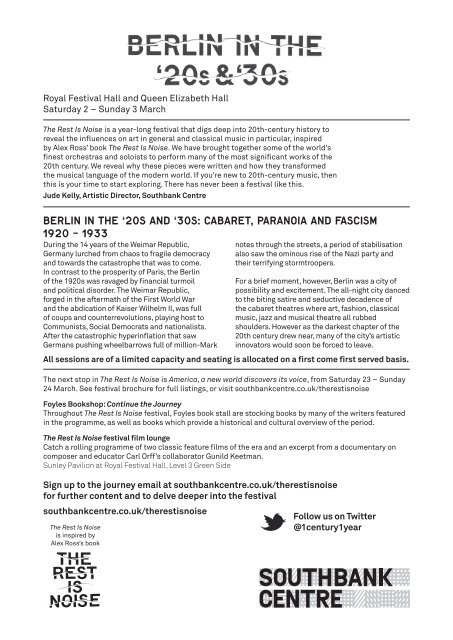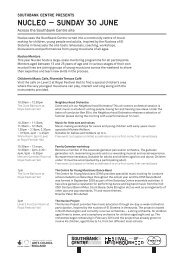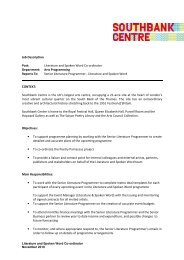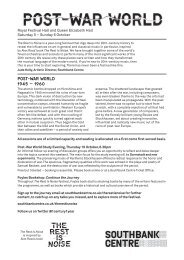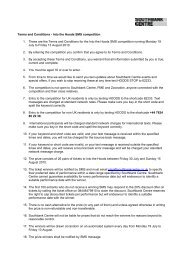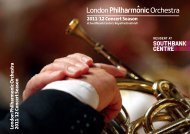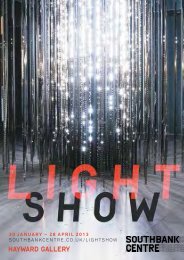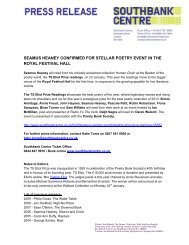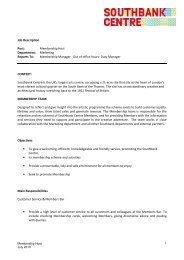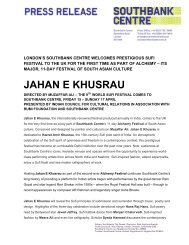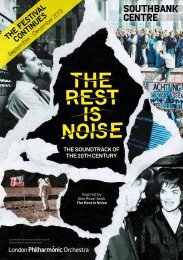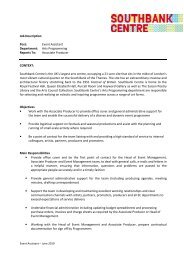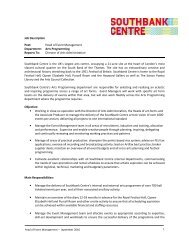berlin in the ‘20s and ‘30s cabaret paranoia and fascism 1920 – 1933
Berlin freesheet.indd - The Rest is Noise - Southbank Centre
Berlin freesheet.indd - The Rest is Noise - Southbank Centre
- No tags were found...
Create successful ePaper yourself
Turn your PDF publications into a flip-book with our unique Google optimized e-Paper software.
Royal Festival Hall <strong>and</strong> Queen Elizabeth Hall<br />
Saturday 2 <strong>–</strong> Sunday 3 March<br />
The Rest Is Noise is a year-long festival that digs deep <strong>in</strong>to 20th-century history to<br />
reveal <strong>the</strong> <strong>in</strong>fluences on art <strong>in</strong> general <strong>and</strong> classical music <strong>in</strong> particular, <strong>in</strong>spired<br />
by Alex Ross’ book The Rest Is Noise. We have brought toge<strong>the</strong>r some of <strong>the</strong> world’s<br />
f<strong>in</strong>est orchestras <strong>and</strong> soloists to perform many of <strong>the</strong> most significant works of <strong>the</strong><br />
20th century. We reveal why <strong>the</strong>se pieces were written <strong>and</strong> how <strong>the</strong>y transformed<br />
<strong>the</strong> musical language of <strong>the</strong> modern world. If you’re new to 20th-century music, <strong>the</strong>n<br />
this is your time to start explor<strong>in</strong>g. There has never been a festival like this.<br />
Jude Kelly, Artistic Director, Southbank Centre<br />
<strong>berl<strong>in</strong></strong> <strong>in</strong> <strong>the</strong> <strong>‘20s</strong> <strong>and</strong> <strong>‘30s</strong>: <strong>cabaret</strong>, <strong>paranoia</strong> <strong>and</strong> <strong>fascism</strong><br />
<strong>1920</strong> <strong>–</strong> <strong>1933</strong><br />
Dur<strong>in</strong>g <strong>the</strong> 14 years of <strong>the</strong> Weimar Republic,<br />
Germany lurched from chaos to fragile democracy<br />
<strong>and</strong> towards <strong>the</strong> catastrophe that was to come.<br />
In contrast to <strong>the</strong> prosperity of Paris, <strong>the</strong> Berl<strong>in</strong><br />
of <strong>the</strong> <strong>1920</strong>s was ravaged by f<strong>in</strong>ancial turmoil<br />
<strong>and</strong> political disorder. The Weimar Republic,<br />
forged <strong>in</strong> <strong>the</strong> aftermath of <strong>the</strong> First World War<br />
<strong>and</strong> <strong>the</strong> abdication of Kaiser Wilhelm II, was full<br />
of coups <strong>and</strong> counterrevolutions, play<strong>in</strong>g host to<br />
Communists, Social Democrats <strong>and</strong> nationalists.<br />
After <strong>the</strong> catastrophic hyper<strong>in</strong>flation that saw<br />
Germans push<strong>in</strong>g wheelbarrows full of million-Mark<br />
notes through <strong>the</strong> streets, a period of stabilisation<br />
also saw <strong>the</strong> om<strong>in</strong>ous rise of <strong>the</strong> Nazi party <strong>and</strong><br />
<strong>the</strong>ir terrify<strong>in</strong>g stormtroopers.<br />
For a brief moment, however, Berl<strong>in</strong> was a city of<br />
possibility <strong>and</strong> excitement. The all-night city danced<br />
to <strong>the</strong> bit<strong>in</strong>g satire <strong>and</strong> seductive decadence of<br />
<strong>the</strong> <strong>cabaret</strong> <strong>the</strong>atres where art, fashion, classical<br />
music, jazz <strong>and</strong> musical <strong>the</strong>atre all rubbed<br />
shoulders. However as <strong>the</strong> darkest chapter of <strong>the</strong><br />
20th century drew near, many of <strong>the</strong> city’s artistic<br />
<strong>in</strong>novators would soon be forced to leave.<br />
All sessions are of a limited capacity <strong>and</strong> seat<strong>in</strong>g is allocated on a first come first served basis.<br />
The next stop <strong>in</strong> The Rest Is Noise is America, a new world discovers its voice, from Saturday 23 <strong>–</strong> Sunday<br />
24 March. See festival brochure for full list<strong>in</strong>gs, or visit southbankcentre.co.uk/<strong>the</strong>restisnoise<br />
Foyles Bookshop: Cont<strong>in</strong>ue <strong>the</strong> Journey<br />
Throughout The Rest Is Noise festival, Foyles book stall are stock<strong>in</strong>g books by many of <strong>the</strong> writers featured<br />
<strong>in</strong> <strong>the</strong> programme, as well as books which provide a historical <strong>and</strong> cultural overview of <strong>the</strong> period.<br />
The Rest Is Noise festival film lounge<br />
Catch a roll<strong>in</strong>g programme of two classic feature films of <strong>the</strong> era <strong>and</strong> an excerpt from a documentary on<br />
composer <strong>and</strong> educator Carl Orff’s collaborator Gunild Keetman.<br />
Sunley Pavilion at Royal Festival Hall, Level 3 Green Side<br />
Sign up to <strong>the</strong> journey email at southbankcentre.co.uk/<strong>the</strong>restisnoise<br />
for fur<strong>the</strong>r content <strong>and</strong> to delve deeper <strong>in</strong>to <strong>the</strong> festival<br />
southbankcentre.co.uk/<strong>the</strong>restisnoise<br />
The Rest Is Noise<br />
is <strong>in</strong>spired by<br />
Alex Ross’s book<br />
Follow us on Twitter<br />
@1century1year
Saturday 2 march<br />
10.15am <strong>–</strong> 11.15 am<br />
The Front Room at<br />
Queen Elizabeth Hall<br />
11.30am <strong>–</strong> 12.30pm<br />
Queen Elizabeth Hall<br />
1pm <strong>–</strong> 2pm<br />
The Front Room at<br />
Queen Elizabeth Hall<br />
Purcell Room at<br />
Queen Elizabeth Hall<br />
Spirit Level at<br />
Royal Festival Hall<br />
Level 4 Green Bar at<br />
Royal Festival Hall<br />
2.30pm <strong>–</strong> 3.30pm<br />
Queen Elizabeth Hall<br />
2.30pm <strong>–</strong> 3pm<br />
Blue Room, Spirit Level at<br />
Royal Festival Hall<br />
4pm <strong>–</strong> 5pm<br />
Purcell Room at<br />
Queen Elizabeth Hall<br />
The Front Room at<br />
Queen Elizabeth Hall<br />
Level 4 Blue Bar<br />
at Royal Festival Hall<br />
Level 4 Green Bar<br />
at Royal Festival Hall<br />
4pm <strong>–</strong> 5.15pm<br />
Blue Room, Spirit Level at<br />
Royal Festival Hall<br />
Breakfast with Kurt Weill: The Threepenny Opera<br />
Grab a coffee <strong>and</strong> delve <strong>in</strong>side <strong>the</strong> work<strong>in</strong>gs of some of <strong>the</strong> music beh<strong>in</strong>d The Rest Is<br />
Noise festival <strong>in</strong> this fun <strong>and</strong> practical session. Led by composer <strong>and</strong> animateur John<br />
Browne, with Southbank Centre Artist-<strong>in</strong>-Residence <strong>and</strong> Voicelab Director, Mary K<strong>in</strong>g.<br />
Frederick Taylor: Keynote Lecture<br />
Germany entered <strong>the</strong> 20th century united <strong>and</strong> strong. By <strong>the</strong> 1930s, scarred by war <strong>and</strong><br />
unemployment, Germany embraced National Socialism. A decade later, Berl<strong>in</strong> lay <strong>in</strong> ru<strong>in</strong>s.<br />
Frederick Taylor discusses <strong>the</strong>se tumultuous years. Includes Q <strong>and</strong> A<br />
Listen to This: A listen<strong>in</strong>g guide to <strong>the</strong> weekend’s music<br />
Gillian Moore, Southbank Centre’s Head of Classical Music, talks about <strong>and</strong> plays<br />
recorded extracts of music <strong>in</strong> Berl<strong>in</strong> <strong>in</strong> <strong>the</strong> <strong>‘20s</strong> & <strong>‘30s</strong>, <strong>in</strong>clud<strong>in</strong>g Weill, Schoenberg <strong>and</strong><br />
H<strong>in</strong>demith. Followed by a performance of <strong>the</strong> London Philharmonic Orchestra’s<br />
New Horizons project at 2.10pm.<br />
Brecht’s Composers<br />
Composer Dom<strong>in</strong>ic Muldowney discusses Bertolt Brecht, a central artistic figure of<br />
Weimar Germany, <strong>and</strong> <strong>the</strong> music collaborations he made. Includes Q <strong>and</strong> A<br />
The Dark Charisma of Adolf Hitler: Episode 1<br />
With <strong>the</strong> help of testimony from those who lived through <strong>the</strong> times, film archive, colour<br />
home movies <strong>and</strong> new documentary footage, this recent BBC film reveals how Hitler<br />
went from a ‘peculiar’ nobody to Chancellor <strong>and</strong> Führer of <strong>the</strong> German people.<br />
Noise Bites: A whistle-stop tour through history<br />
A quick journey through <strong>the</strong> key artists, social movements <strong>and</strong> scientific breakthroughs<br />
of an era. Topics explored <strong>in</strong> this session <strong>in</strong>clude Nosferatu, New objectivity, Zeitoper<br />
<strong>and</strong> The Modern Sanitorium with a range of speakers <strong>and</strong> performers.<br />
Alex Ross: Why <strong>and</strong> how did music become so politicised<br />
Alex Ross gives his second keynote talk of The Rest Is Noise festival, focus<strong>in</strong>g on <strong>the</strong><br />
onset of Nazism <strong>and</strong> <strong>the</strong> shift towards <strong>in</strong>tensely political music <strong>in</strong> <strong>the</strong> ’20s <strong>and</strong> ’30s, <strong>and</strong><br />
broaden<strong>in</strong>g <strong>the</strong> focus to look at parallel developments <strong>in</strong> America <strong>and</strong> <strong>the</strong> Soviet Union.<br />
Kurt Weill: From Time to Time<br />
A short film made by Deborah May for Southbank Centre <strong>in</strong> 2000, mark<strong>in</strong>g <strong>the</strong><br />
centenary of <strong>the</strong> composer’s birth <strong>and</strong> featur<strong>in</strong>g <strong>in</strong>terviews with two people who<br />
attended <strong>the</strong> world premiere of The Threepenny Opera <strong>in</strong> 1928.<br />
Mark Miodownik: Modern Materials for Modern Times<br />
In <strong>the</strong> 1930s modern materials entered mass production. Mark Miodownik, Professor of<br />
Materials <strong>and</strong> Society at University College London, gives a keynote talk on <strong>the</strong> scientific<br />
developments which led to this revolution, <strong>and</strong> <strong>the</strong> impact of nylon. Includes Q <strong>and</strong> A<br />
Listen to This: A listen<strong>in</strong>g guide to <strong>the</strong> weekend’s music<br />
Please see 1pm. Preceded by a performance from <strong>the</strong> London Philharmonic Orchestra’s<br />
New Horizons project at 3.30pm.<br />
Ben Schofield: Weimar Legacies<br />
Ben Schofield gives this illustrated talk which looks at how <strong>the</strong> streets of Weimar Berl<strong>in</strong><br />
<strong>in</strong>fluenced <strong>the</strong> cultural production of <strong>the</strong> era <strong>–</strong> a culture which is still <strong>in</strong>fluential today.<br />
Includes Q <strong>and</strong> A<br />
Noise Bites: A whistle-stop tour through history<br />
A quick journey through <strong>the</strong> key artists, social movements <strong>and</strong> scientific breakthroughs<br />
of an era. Topics explored <strong>in</strong> this session <strong>in</strong>clude Albert Speer, Laban <strong>and</strong> his school,<br />
sulphur drugs <strong>and</strong> Otto Dix, with a range of speakers.<br />
People on Sunday<br />
This 1930 silent drama follows some Berl<strong>in</strong> residents on a summer’s day. This remarkable<br />
depiction of life before Hitler became Chancellor was scripted by Billy Wilder.
5.30pm <strong>–</strong> 6.30pm<br />
Purcell Room at<br />
Queen Elizabeth Hall<br />
Level 4 Blue Bar<br />
at Royal Festival Hall<br />
5.30pm <strong>–</strong> 6pm<br />
The Clore Ballroom at<br />
Royal Festival Hall<br />
6pm & 9.45pm<br />
The Clore Ballroom at<br />
Royal Festival Hall<br />
6.30pm <strong>–</strong> 7pm<br />
Blue Room, Spirit Level at<br />
Royal Festival Hall<br />
7pm <strong>–</strong> 8pm<br />
Blue Room, Spirit Level at<br />
Royal Festival Hall<br />
7.30pm <strong>–</strong> 9pm<br />
Royal Festival Hall<br />
8.30pm <strong>–</strong> 9.45pm<br />
Blue Room, Spirit Level at<br />
Royal Festival Hall<br />
John Gray: Nazism <strong>and</strong> <strong>the</strong> Myth of Progress<br />
John Gray is one of <strong>the</strong> most significant th<strong>in</strong>kers of our time. Focus<strong>in</strong>g on <strong>the</strong> <strong>in</strong>ter-war<br />
period, Gray looks at <strong>the</strong> work of Joseph Roth, Stefan Zweig <strong>and</strong> Arthur Koestler <strong>and</strong> how<br />
<strong>the</strong> <strong>the</strong>mes of nationality, memory <strong>and</strong> terror were fundamental to <strong>the</strong>ir work. Includes Q&A.<br />
Ben Schofield: Weimar Legacies<br />
Please see 4pm.<br />
Meow Meow <strong>and</strong> Weill<br />
Patrick Bailey <strong>in</strong>terviews Meow Meow <strong>and</strong> a young s<strong>in</strong>ger from <strong>the</strong> Mahagonny<br />
Songspiel cast on Kurt Weill’s Legacy.<br />
Mahogonny Songspiel<br />
A free concert performance of Kurt Weill <strong>and</strong> Bertolt Brecht’s first collaboration, given<br />
by London Philharmonic Orchestra’s Foyle Future Firsts.<br />
Kurt Weill: From Time to Time<br />
Please see 2.30pm.<br />
The Dark Charisma of Adolf Hitler: Episode 1<br />
Please see 1pm.<br />
*London Philharmonic Orchestra: The Threepenny Opera<br />
*Not <strong>in</strong>cluded <strong>in</strong> <strong>the</strong> Day or Weekend Pass. RETURNS ONLY<br />
People on Sunday<br />
Please see 4pm.<br />
sunday 3 march<br />
11am <strong>–</strong> 12.30pm<br />
The Clore Ballroom at<br />
Royal Festival Hall<br />
11.45am <strong>–</strong> 12.45pm<br />
Level 4 Blue Bar at<br />
Royal Festival Hall<br />
Level 4 Green Bar at<br />
Royal Festival Hall<br />
St Paul’s Roof Pavilion at<br />
Royal Festival Hall<br />
The Weston Roof Pavilion<br />
at Royal Festival Hall,<br />
Level 6 Green Side<br />
1pm <strong>–</strong> 2pm<br />
Purcell Room at<br />
Queen Elizabeth Hall<br />
1.30pm <strong>–</strong> 2.30pm<br />
The Front Room at<br />
Queen Elizabeth Hall<br />
Emil <strong>and</strong> <strong>the</strong> Detectives<br />
This 1931 film tells <strong>the</strong> story of a young boy named Emil whose money is stolen on a<br />
tra<strong>in</strong> to Berl<strong>in</strong> <strong>and</strong> <strong>the</strong> adventures that follow. This family-friendly classic of <strong>the</strong> period<br />
has a screenplay by Billy Wilder, adapted from <strong>the</strong> Erich Käster novel.<br />
Yvonne Sherratt: Hitler’s Philosophers<br />
Hitler saw himself as a ‘philosopher-leader’ <strong>and</strong> ga<strong>in</strong>ed <strong>the</strong> support of many<br />
<strong>in</strong>tellectuals. Sherratt uncovers ambition, violence <strong>and</strong> betrayal. Includes Q&A<br />
Berl<strong>in</strong> <strong>in</strong> Hollywood<br />
Ian Christie, a lead<strong>in</strong>g historian of 20th-century film, tells <strong>the</strong> story of German émigré<br />
filmmakers who established <strong>the</strong>mselves <strong>in</strong> America as <strong>the</strong> Nazis swept to power. Includ<strong>in</strong>g<br />
legendary names such as Marlene Dietrich, Fritz Lang <strong>and</strong> Karl Freund. Includes Q&A<br />
Noise Bites: An <strong>in</strong>tense whistle-stop tour through history<br />
These high-energy sessions offer a crash course <strong>in</strong> history <strong>and</strong> <strong>the</strong> people who made it.<br />
Topics explored <strong>in</strong> this session <strong>in</strong>clude Marlene Dietrich, <strong>the</strong> swastika, gay culture <strong>and</strong><br />
George Grosz, with a range of speakers <strong>and</strong> performers.<br />
A Beg<strong>in</strong>ner’s Guide to Serialism<br />
Jonathan Cross of Oxford University explores <strong>the</strong> serialism method of composition<br />
which primarily began with Schoenberg’s 12-tone technique. Includes Q <strong>and</strong> A<br />
*Karim Said: 12 Tone Piano<br />
Hear Schoenberg’s explorations of this idiosyncratic sound world. Introduced by Sara<br />
Mohr-Pietsch.<br />
*Not <strong>in</strong>cluded <strong>in</strong> <strong>the</strong> Day or Weekend Pass. Tickets available from <strong>the</strong> Ticket Office from £10.<br />
Brecht Theatre<br />
Playwright David Edgar jo<strong>in</strong>s actress Charlotte R<strong>and</strong>le <strong>and</strong> Jude Kelly to discuss <strong>the</strong>ir<br />
relationship to Bertolt Brecht <strong>and</strong> his <strong>in</strong>fluence. Includes Q&A.
1.30pm <strong>–</strong> 2.30pm<br />
St Paul’s Roof Pavilion at<br />
Royal Festival Hall<br />
Spirit Level at<br />
Royal Festival Hall<br />
The Weston Roof Pavilion<br />
at Royal Festival Hall,<br />
Level 6 Green Side<br />
3pm <strong>–</strong> 4pm<br />
Purcell Room at<br />
Queen Elizabeth Hall<br />
The Weston Roof Pavilion<br />
at Royal Festival Hall,<br />
Level 6 Green Side<br />
3pm <strong>–</strong> 4.10pm<br />
Spirit Level at<br />
Royal Festival Hall<br />
4.30pm <strong>–</strong> 5.30pm<br />
Purcell Room at Queen<br />
Elizabeth Hall<br />
The Weston Roof Pavilion<br />
at Royal Festival Hall,<br />
Level 6 Green Side<br />
4.30pm <strong>–</strong> 5.40pm<br />
Spirit Level at<br />
Royal Festival Hall<br />
5.45pm <strong>–</strong> 6.30pm<br />
The Clore Ballroom at<br />
Royal Festival Hall<br />
6.30pm <strong>–</strong> 7.40pm<br />
Blue Room, Spirit Level at<br />
Royal Festival Hall<br />
7.30pm<br />
Queen Elizabeth Hall<br />
8pm <strong>–</strong> c.10.10pm<br />
The Clore Ballroom at<br />
Royal Festival Hall<br />
Noise Bites: An <strong>in</strong>tense whistle-stop tour through history<br />
These high-energy sessions offer a crash course <strong>in</strong> history <strong>and</strong> <strong>the</strong> people who made<br />
it. Topics <strong>in</strong> this session <strong>in</strong>clude Walter Benjam<strong>in</strong>, Volkswagen, Hitler Youth <strong>and</strong><br />
Hyper<strong>in</strong>flation, with a range of speakers.<br />
Deutschl<strong>and</strong> Dada<br />
This 1969 documentary explores <strong>the</strong> contributions of German artists to <strong>the</strong> early 20th<br />
century Dadaist movement, which rejected previous convention <strong>and</strong> delighted <strong>in</strong><br />
nihilistic satire <strong>in</strong> pa<strong>in</strong>t<strong>in</strong>g, sculpture <strong>and</strong> literature.<br />
Visual Arts: Satire, Realism & Responses to <strong>the</strong> Regime<br />
Ruth Hemus takes on a journey through Dada <strong>and</strong> <strong>the</strong> visual arts, look<strong>in</strong>g at how artists<br />
such as Hannah Höech, Raoul Hausmann <strong>and</strong> John Heartfield challenged <strong>the</strong> exist<strong>in</strong>g<br />
bourgeois order <strong>in</strong> <strong>the</strong> <strong>in</strong>ter-war period. Includes Q&A<br />
Brecht’s Poetry: Read<strong>in</strong>gs <strong>and</strong> poems sung with piano accompaniment<br />
Brecht’s great poems have lit up <strong>the</strong>atre for every generation s<strong>in</strong>ce <strong>the</strong>y were written.<br />
Chaired by Karen Leeder, a specialist <strong>in</strong> German poetry, alongside poets Bernard<br />
O’Donoghue <strong>and</strong> Jamie McKendrick.<br />
Christopher Isherwood: Goodbye to Berl<strong>in</strong><br />
Novelist Ka<strong>the</strong>r<strong>in</strong>e Bucknell <strong>in</strong> discussion with biographer Peter Parker <strong>and</strong> actor Harry<br />
Mell<strong>in</strong>g. Published <strong>in</strong> 1938, Goodbye to Berl<strong>in</strong> <strong>in</strong>troduced Sally Bowles. Includes Q&A<br />
Berl<strong>in</strong>: Symphony of a Metropolis<br />
A classic of experimental c<strong>in</strong>ema, this 1927 silent film by Walter Ruttmann is a visual<br />
symphony <strong>in</strong> five movements, pay<strong>in</strong>g homage to <strong>the</strong> metropolis of Berl<strong>in</strong>, to <strong>the</strong> pulse of<br />
modern life <strong>and</strong> to <strong>the</strong> idea of <strong>the</strong> city as one big social organism.<br />
Lisa Appignanesi: Cabaret Talk<br />
Lisa Appignanesi presents <strong>the</strong> cultural history of <strong>cabaret</strong>. Cabaret found joyful expression<br />
<strong>in</strong> Berl<strong>in</strong> <strong>in</strong> <strong>the</strong> <strong>1920</strong>s <strong>and</strong> ’30s but its roots go back to <strong>the</strong> Chat Noir <strong>in</strong> Paris <strong>in</strong> <strong>the</strong> 1880s.<br />
Lisa Appignanesi is a writer <strong>and</strong> critic whose books <strong>in</strong>clude The Cabaret. Includes Q&A<br />
Visual Arts: Satire, Realism & Responses to <strong>the</strong> Regime<br />
Please see 1.30pm.<br />
Kuhle Wampe<br />
Conceived <strong>and</strong> written by Bertolt Brecht, this 1931 propag<strong>and</strong>a film is an extraord<strong>in</strong>ary<br />
cultural product of its time, depict<strong>in</strong>g <strong>the</strong> plight of <strong>the</strong> work<strong>in</strong>g class.<br />
Round Up<br />
Jude Kelly, Artistic Director of Southbank Centre, leads a round-up session look<strong>in</strong>g at<br />
<strong>the</strong> <strong>the</strong>mes of <strong>the</strong> weekend, <strong>and</strong> <strong>in</strong>vites your feedback about <strong>the</strong> festival. Includes Q&A<br />
Berl<strong>in</strong>: Symphony of a Metropolis<br />
Please see 3pm.<br />
*Kurt Weill’s Seven Deadly S<strong>in</strong>s<br />
Music from composers forced to emigrate from Nazi Germany. Performed by BBC<br />
Concert Orchestra, Andre de Ridder <strong>and</strong> Shara Worden of My Brightest Diamond.<br />
*Not <strong>in</strong>cluded <strong>in</strong> <strong>the</strong> Day or Weekend Pass. Tickets available from <strong>the</strong> ticket office from £12.<br />
Cabaret<br />
One of <strong>the</strong> most iconic films to portray Weimar Berl<strong>in</strong>, Bob Fosse’s eight Oscar-w<strong>in</strong>n<strong>in</strong>g<br />
film adaptation of <strong>the</strong> stage musical is a must-see. Liza M<strong>in</strong>nelli makes a careerdef<strong>in</strong><strong>in</strong>g<br />
performance as wayward s<strong>in</strong>ger Sally Bowles <strong>in</strong> this s<strong>in</strong>ister classic movie.<br />
The next stop <strong>in</strong> The Rest Is Noise is America, Saturday 23 <strong>–</strong> Sunday 24 March.<br />
See your festival brochure for more <strong>in</strong>formation.<br />
Pr<strong>in</strong>cipal orchestra<br />
partner:<br />
Media partner:


